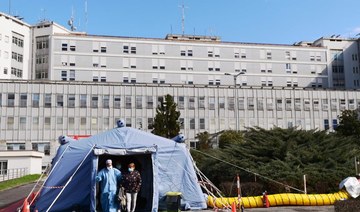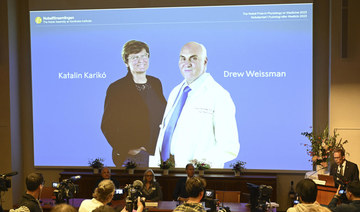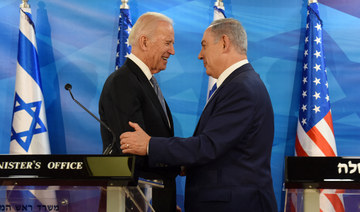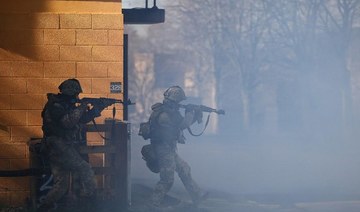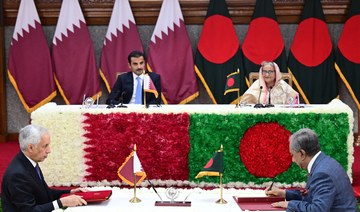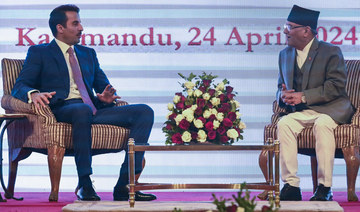ROME: Italy announced a sweeping quarantine Sunday for its northern regions, igniting travel chaos as it restricted the movements of 16 million people — more than one quarter of its population — in a bid to halt the relentless march of the new coronavirus across Europe.
Confusion reigned from Milan to Venice as residents and tourists tried to figure out exactly when and how the new rules were coming into effect. Travelers rushed to train stations and crammed aboard standing-room only trains, tucking their faces into scarves and sharing sanitizing gel.
After Italy saw its biggest one-day jump in infections, Italian Premier Giuseppe Conte signed a quarantine decree overnight for the country’s prosperous north. Areas under lockdown include Milan, Italy’s financial hub and the main city in Lombardy, and Venice, the main city in the neighboring Veneto region. The extraordinary measures will be in place until April 3.
“There will be a ban for everybody to move in and out of these territories and also within the same territory,” Conte said. “Exceptions will be allowed only for proven professional needs, exceptional cases and health issues.”
The fate of foreign visitors stuck in Italy’s new quarantine zones was not immediately clear.
While the Vatican wasn’t directly affected by the lockdown, the pope, who has been ill, held his Sunday blessing by video instead of in person, describing the strangeness of feeling like he was “in a cage.”
Italy’s move echoed China’s lockdown of some 60 million people in central Hubei province in late January, which is now in its sixth week. The head of the World Health Organization, Tedros Adhanom Ghebreyesus, on Sunday tweeted his support for “the government and people of Italy,” saying they were “taking bold, courageous steps aimed at slowing the speed of the coronavirus.”
China has suffered about three-fourths of the world’s 106,000 coronavirus infections and most of its nearly 3,600 deaths. New infections in China have leveled off dramatically, however, and most of those infected, in China and globally, have already recovered.
But infections mounted higher Sunday in other epicenters — South Korea, Iran and especially Italy. And with a nose-dive in tourist traffic and major disruptions to supply chains worldwide, stocks got off to another rocky start Sunday as Mideast indexes opened down 6% to 8%.
Around the globe, more events and festivals were called off, including the women’s hockey championships in Canada. Bahrain said its Formula One race this month will take place without spectators over virus fears while Japan’s time-honored grand sumo tournament opened Sunday in Osaka with no fans and wrestlers in face masks.
Chaos erupted in the hours before Conte signed the decree, as word leaked about the planned quarantine.
Students at the University of Padua in northern Italy who had been out at bars on a Saturday night saw the reports on their phones and rushed back to grab their belongings and head to the train station. Hundreds of passengers, some wearing face masks and rubber gloves, crammed onto the last local train leaving Padua at 11:30 p.m, sitting on their suitcases in the aisles. No conductor came by to check tickets.
“I read two hours ago that they may be putting out an urgent decree putting Padua in the red zone ... so I decided to go earlier,” said student Roberto Pagliara, heading to his hometown of Puglia in southern Italy.
But the governor of Puglia urged people like him to stay away and not bring virus infections down south.
“Get off at the first railway station, don’t take planes to Bari and Brindisi,” Gov. Michele Emiliano said in his dramatic appeal, citing two cities in Puglia with airports. “Turn around in your cars, get off the pullman buses at the next stop.”
Italy on Saturday reported its biggest daily increase in coronavirus cases since its outbreak began on Feb. 21. The number of infected people rose 1,247, taking the total to 5,883, and the death toll rose to 233.
Regional politicians in Italy were taken aback by the lockdown. The mayor of Asti, in the Piedmont region, posted an irate video on his Facebook page slamming Rome for not keeping regional leaders in the loop.
“Nobody told me,” Maurizio Rasero screamed, adding that he had hundreds of messages on his cell phone from alarmed citizens. “It’s incredible that information that is so delicate and important would come out in the newspaper first.”
In Rome, some Masses were held outdoors, including one on an asphalted sports field.
“I am near in prayer to persons who are suffering from the current epidemic of coronavirus and to all those caring for them,’’ Pope Francis said in his video service Sunday, before briefly appearing at his window to greet the crowd.
The virus outbreak has left the cruise ship industry in disarray.
The Grand Princess cruise ship, where 21 people have tested positive for the virus, was heading Sunday to Oakland after idling off San Francisco for days. It expects to land Monday. Captain John Smith said ill passengers will be taken into hospitals and healthy Americans will be put into quarantines. He said he was not yet told what will happen to passengers from other countries. The ship had a cluster of almost 20 infections during an earlier voyage that has led to one death.
Another cruise ship is in quarantine on the Nile in Egypt with 45 confirmed virus cases. Two other ships with no confirmed cases were turned away this weekend from Malaysia and Malta amid virus fears.
The US Centers for Disease Control and Prevention urged older adults and people with severe medical conditions to “stay home as much as possible” and avoid crowds. A federal official told The Associated Press that the White House had overruled health officials who wanted to recommend that elderly and sick Americans not fly on commercial airlines. A spokesman for US Vice President denied the report.
Meanwhile, the US death toll from the virus climbed to 19, with all but three victims in Washington state, and infections rose to over 430.
While many scientists said the world is clearly in the grips of a pandemic — a serious global outbreak – the WHO isn’t calling it that yet, saying the word might spook the world further.
“This outbreak meets all the definitions for a pandemic,” said Devi Sridhar, a professor of global public health at the University of Edinburgh.
As of Saturday, nearly 90,000 cases have been reported in Asia; nearly 10,000 in Europe; some 7,000 in the Mideast; about 450 in North America, Latin America and the Caribbean, and fewer than 50 cases reported so far in Africa.
In Iran, fears over the virus and the government’s waning credibility has become a major challenge to leaders already reeling from American sanctions. The virus killed 49 more people in Iran in the last 24 hours, bringing the death toll to 194 amid 6,566 confirmed cases.
China on Sunday reported 44 new cases over the past 24 hours, the lowest level since it began publishing nationwide figures on Jan 20, and 27 new fatalities. South Korea reported 272 new cases, taking its total to 7,313, with 50 deaths overall.
Even islands in the middle of the Indian Ocean have not been spared, with the tiny archipelago nation of the Maldives reporting its two first virus cases.
Travel chaos erupts as Italy quarantines north to halt virus
https://arab.news/pj82h
Travel chaos erupts as Italy quarantines north to halt virus

- Confusion reigned from Milan to Venice as residents and tourists tried to figure out exactly when the new rules were coming into effect
- Travelers rushed to train stations and crammed aboard standing-room only trains
Vaccines save at least 154 million lives in 50 years: WHO
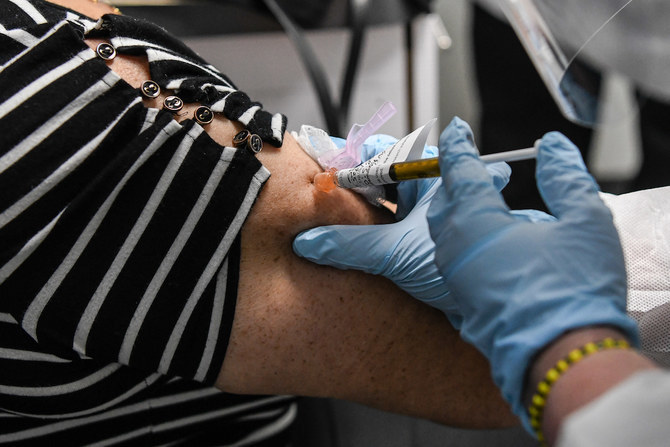
- That is the equivalent of six lives saved every minute of every year of the half century, the UN health agency said
- “Vaccines are among the most powerful inventions in history, making once-feared diseases preventable,” WHO chief Tedros Adhanom Ghebreyesus said
GENEVA: Global immunization efforts have saved at least 154 million lives in the past 50 years, the World Health Organization said Wednesday, adding that most of those to benefit were infants.
That is the equivalent of six lives saved every minute of every year of the half century, the UN health agency said.
In a study published in the Lancet, WHO gave a comprehensive analysis of the impact of 14 vaccines used under the Expanded Programme on Immunization (EPI), which celebrates its 50th anniversary next month.
“Vaccines are among the most powerful inventions in history, making once-feared diseases preventable,” WHO chief Tedros Adhanom Ghebreyesus said in a statement.
“Thanks to vaccines, smallpox has been eradicated, polio is on the brink, and with the more recent development of vaccines against diseases like malaria and cervical cancer, we are pushing back the frontiers of disease,” he said.
“With continued research, investment and collaboration, we can save millions more lives today and in the next 50 years.”
The study said infants accounted for 101 million of the lives saved through immunization over the five decades.
“Immunization was the single greatest contribution of any health intervention to ensuring babies not only see their first birthdays but continue leading healthy lives into adulthood,” WHO said.
Over 50 years, vaccines against 14 diseases — diphtheria, Haemophilus influenza type B, hepatitis B, Japanese encephalitis, measles, meningitis A, pertussis, invasive pneumococcal disease, polio, rotavirus, rubella, tetanus, tuberculosis, and yellow fever — had directly contributed to reducing infant deaths by 40 percent, the study found.
For Africa, the reduction was more than 50 percent, it said.
The vaccine against measles — a highly contagious disease by a virus that attacks mainly children — had the most significant impact.
That jab accounted for 60 percent of the lives saved due to immunization, according to the study.
The polio vaccine means that more than 20 million people are able to walk today who would otherwise have been paralyzed.
The study also showed that when a vaccine saves a child’s life, that person goes on to live an average of 66 years of full health on average — with a total of 10.2 billion full health years gained over the five decades.
“These gains in childhood survival highlight the importance of protecting immunization progress,” WHO said, pointing to accelerating efforts to reach 67 million children who missed at least one vaccination during the Covid pandemic.
Sunak, Scholz vow support for Ukraine for ‘as long as it takes’
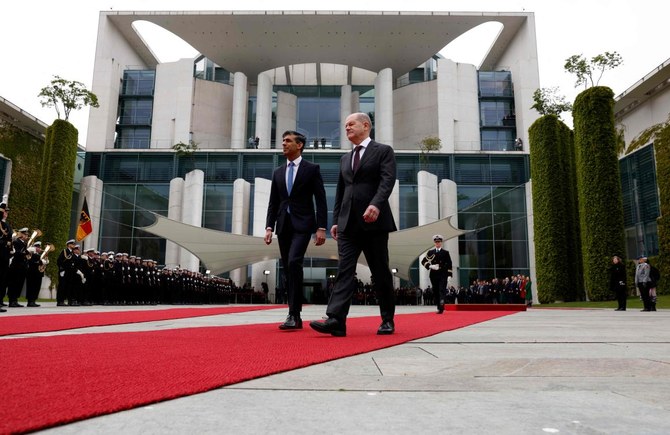
- “We’re defending the values that are incredibly important to us,” the UK leader added
- Sunak embarked on a two-day trip to Europe designed to get the spotlight back on Ukraine after months of world attention on Israel’s war against Hamas in Gaza
BERLIN: The leaders of Britain and Germany pledged Wednesday to back Ukraine in its war with Russia for “as long as it takes,” but the German chancellor doubled down on his refusal to deliver long-range Taurus missiles to Kyiv.
UK Premier Rishi Sunak was on his first trip to the German capital since becoming prime minister 18 months ago, after visiting Poland on Tuesday where he pledged additional money for Kyiv and announced plans to boost UK defense spending.
“We’re united on wanting to support Ukraine for as long as it takes,” Sunak told reporters, adding that Russian President Vladimir Putin’s aggression must “end in failure.”
“We’re defending the values that are incredibly important to us,” the UK leader added, standing alongside German Chancellor Olaf Scholz during a press conference at Germany’s chancellery.
Sunak embarked on a two-day trip to Europe designed to get the spotlight back on Ukraine after months of world attention on Israel’s war against Hamas in Gaza.
In Poland, he pledged an additional £500 million ($617 million) for Ukraine, taking the amount of money the UK has contributed to Ukraine’s war effort to £12 billion.
Kyiv has been pleading with allies to ramp up supplies of ammunition and air defenses desperately needed to repel relentless Russian attacks.
US lawmakers eased the pressure last weekend by unblocking a $61-billion military aid package for Kyiv following six months of political wrangling.
But EU defense and foreign ministers insist that Europe must still speed up its deliveries of arms to Ukraine.
Germany has answered Kyiv’s call in recent days by saying it would send an extra Patriot air defense system to Ukraine.
But Scholz again resisted calls to send long-range Taurus missiles, which Ukraine desperately wants but which Germany fears would escalate the conflict.
“My decision is very clear” on not sending the Taurus, said Scholz.
“But my decision is also very clear that we will continue to be the biggest supporter of Ukraine in Europe,” he added.
Sunak hailed “a new chapter” in relations between Britain and Germany as they announced plans for a joint endeavour to develop remote-controlled Howitzer artillery systems that will be fitted to Boxer armored vehicles.
“At this dangerous moment for the world, the UK and Germany are standing side by side to preserve security and prosperity at home and across our continent,” Sunak said before landing in Berlin.
In Warsaw, the UK PM pledged to gradually increase UK defense spending to 2.5 percent of GDP by 2030 as NATO countries face pressure to raise defense expenditure in the face of these global threats.
Sunak said that the West was facing its most dangerous period since the end of the Cold War, with Russia’s assault on Ukraine in its third year, but also the threat of escalation in the Middle East.
More of NATO’s European members — including heavyweights France and Germany — have increased their defense spending recently to meet the alliance’s two percent of GDP target.
Sunak refused to say that NATO should increase its target to 2.5 percent but added: “We recognize we need to do more,” adding: “I do believe we are in a world where defense spending is rising.”
EU chief Ursula von der Leyen recently warned that European countries need to boost defense budgets and Brussels is set to come up with further proposals by a summit of EU leaders in June.
It has put forward a 1.5-billion-euro ($1.6-billion) strategy to step up defense production, but officials say this is nowhere near sufficient.
The UK, which quit the European Union in early 2020, is among some 20 countries to have signed up to Germany’s air defense project called the European Sky Shield Initiative.
The project would involve joint procurement for short-, medium- and long-range systems, including the German-made Iris-T, the American Patriot system and the US-Israeli Arrow 3.
France has so far declined to sign up to the pact, with officials there arguing instead for an air defense system using European equipment.
Germany charges six suspected Daesh-K members over attack plots

- The suspects are charged with founding a terrorist organization, among other things
- They intended to carry out high-profile attacks in Germany and Western Europe
BERLIN: Germany has charged six foreign nationals for allegedly plotting terrorist attacks on behalf of the Daesh Province of Khorasan (Daesh-K), the federal prosecutor’s office said on Wednesday.
The suspects, identified as Tajik citizens Mukhammadshujo A., Nuriddin K., Shamshud N., Said S., Raboni Z., and Kyrgyz citizen Abrorjon K., are charged with founding a terrorist organization, among other things.
They intended to carry out high-profile attacks in Germany and Western Europe but had no concrete plan when law enforcement intervened, according to the statement.
The suspects, who were arrested in July last year, had been in touch with Daesh-K, the Afghan offshoot of Daesh, which claimed responsibility for a mass shooting in Moscow last month in which at least 137 people were killed.
According to investigators, the suspects arrived in Germany via Ukraine after war broke out there in spring 2022, and formed a terrorist cell together with another member from the Netherlands.
They met regularly to discuss their intentions and scouted potential locations in Germany, the prosecutors’ statement said.
UK police arrest three over migrants’ deaths in Channel
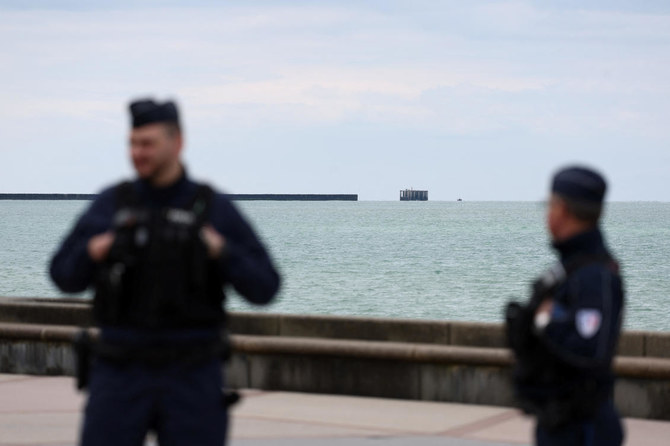
- The men, two Sudanese nationals aged 22 and 19, and a South Sudan national aged 22, were detained
- Suspects were arrested on suspicion of facilitating illegal immigration and entering the UK illegally
LONDON: British police said on Wednesday they had arrested three men over the deaths of five migrants including a child who died attempting to cross the Channel from France the day before.
The deaths occurred when a small overcrowded boat carrying 112 people set out to cross one of the busiest shipping lanes in the world and panic took hold among the passengers not far from the shore.
Rescuers picked up about 50 people, with four taken to hospital, but others stayed on the boat, determined to get to Britain.
Three men, two Sudanese nationals aged 22 and 19, and a South Sudan national aged 22, were detained on Tuesday night on suspicion of facilitating illegal immigration and entering the UK illegally, the National Crime Agency (NCA) said.
“This tragic incident once again demonstrates the threat to life posed by these crossings and bring into focus why it is so important to target the criminal gangs involved in organizing them,” said NCA Deputy Director of investigations Craig Turner.
“We will do all we can with partners in the UK and France to secure evidence, identify those responsible for this event, and bring them to justice.”
French police are also continuing to investigate the circumstances surrounding the incident, alongside their British counterparts, the NCA said.
It added 55 people who were believed to have been on board the boat which arrived in Britain had also been identified.
More than 6,000 people have arrived in Britain this year via small, overloaded boats — usually flimsy inflatable dinghies — that risk being lashed by the waves as they try to reach British shores.
The deadly crossing on Tuesday took place just hours after the British parliament passed a bill paving the way for asylum seekers who arrive in Britain without permission to be deported to Rwanda, a policy which Prime Minister Rishi Sunak argues will deter people from making the dangerous cross-Channel journey.
New agreement to safeguard rights of Bangladeshi workers in Qatar
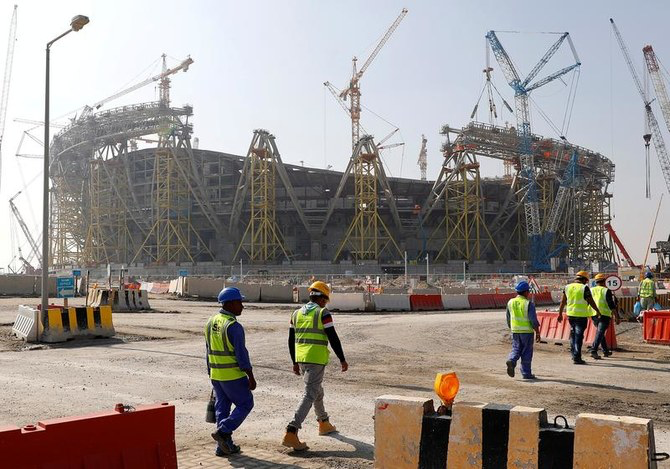
- 350,000 Bangladeshis are employed in Qatar, mostly in construction sector
- MoU signed during Sheikh Tamim bin Hamad Al-Thani’s visit to Dhaka this week
Dhaka: A new agreement between Qatar and Bangladesh includes commitments to establish protections for migrant workers, a top official said on Wednesday, as the Gulf state has been under harsh criticism over failing to safeguard the rights of laborers who constructed its 2022 FIFA World Cup infrastructure.
Migrant workers from South Asia, especially Bangladesh and Nepal, were indispensable to Qatar as it prepared to host the world’s biggest football event, and have been an important part of its economy. Some 350,000 Bangladeshis are employed by Qatar’s government, semi-government and private sector.
The jobs have enabled them to send remittances back home to their families, but many have reported contract violations and illnesses linked to unsafe working conditions. The problems entered the spotlight between 2010, when FIFA granted Qatar the World Cup, and 2022, when the event took place.
During the decade, seven new stadiums, an airport expansion, a new metro and hotels were constructed by 30,000 foreign laborers, according to the Qatari government. Rights groups and investigative journalists have estimated that more than 6,000 of them died in work-related deaths.
A new memorandum on Bangladeshi migrant workers — 80 percent of whom are employed in Qatar’s construction industry — was signed this week as Qatar’s emir, Sheikh Tamim bin Hamad Al-Thani, visited Dhaka.
“A joint working group will be formed for solving labor rights issues,” Khairul Alam, additional secretary at Bangladesh’s Ministry of Expatriates Welfare and Overseas Employment, told Arab News.
“Our Ministry of Expatriates Welfare and Overseas Employment will lead the joint working group from the Bangladeshi side.”
The agreement commits the Qatari and Bangladeshi sides to discuss “ways to develop legislation relevant to areas of labor” and includes plans for a review to ensure that worker rights are in place.
“Labor rights protection, safety and healthy environment issues have also been emphasized in the MoU, and mentioned several times,” Alam said.
“The agreement also said that in case of any issues regarding migrants both countries will sit together and solve the issues amicably.”
The signing of the agreement was welcomed by the Migration Program and Youth Initiatives of BRAC — Bangladesh’s largest development organization, which estimated that more than 1,300 workers from the country died in Qatar during the World Cup construction spree, with many deaths attributed to heart attacks.
“Most of our migrant workers prefer the Middle Eastern countries, and after Saudi Arabia, UAE and Oman, Qatar is the preferred destination for the Bangladeshi migrants. In this context, such a type of MoU on labor employment is helpful for the protection of migrant workers’ rights,” said Shariful Hasan, the program’s associate director.
Hasan told Arab News it was an “expression of interest from both sides to ensure the welfare of the migrants,” who were playing a significant role in Qatar’s development.
“If the migrant-receiving country like Qatar focuses on the welfare and protection of the migrants, it will create a win-win situation for both countries. I think the signing of this MoU is a big development toward this.”



